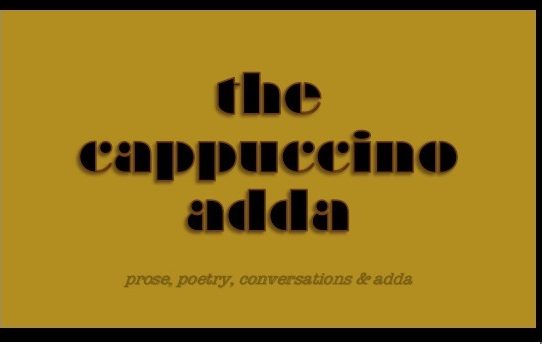On Friday, the 17th of October, seven luminous poets came together to make the Cappuccino Reading event truly enchanting and festive. Thank you Gieve, Sampurna, Mani, Nabina, Dion, Rochelle and Anjali for stringing such exquisite poetry with us.
The evening kick-started with Rochelle’s magical opening poem ‘Swing’ and the evening swiftly slipped on a totem pole of silent bird song. She joyously shared humane lines about hundred chances to err and hundred chances to forgive; her poems flowed like a river, fluidly, into philosophical introspections about the incessant journeys from self-love to self-hate back to self-love. Her tongue-in-cheek poem ‘Baby’ touched upon the plight of working mothers juggling a career and motherhood, where a chagrined mother quips that a baby is nothing but a brand mascot smiling for the shutterbugs. Kudos to yet another power house performance by Rochelle.
All poetry is protest. Nabina through her reading demonstrated to us how folklore, mythology and politics in poetry become a potent and compelling amalgam. She read her new prose poems and poems from her book – Into the Migrant City. Through her poems we got a sneak-peak into the ill-fitted blouse of prose, political lives of terrorist wives and other insignificant women, bindi satellite, eaters of elephants and cows, boot-trotting wilderness –Nabina’s poems ran the entire gamut of rage and reprise.
Eric M. Gurevitch rightly said that there are two types of Sanskritists: those who translate the Bhagavad Gita, and those who do not. We, at Cappuccino readings had the honour to witness Mani Rao’s experimental verse. She is indeed the poet’s poet. The word weaver read excerpts from her new book Kalidasa for the 21st Century Reader. Kama, Shiva, Yakshas leapt out from Mani’s pages as she read excerpts from Kumarasambhava and vignettes from Ritusamhara, a medley of seasons. It didn’t matter if she read her short poems about birds, trees or prima donnas, Mani’s brevity in verse and the intensity of her reinvented Sanskrit translation had the audience enthralled.
We became privy to Joy Goswami and his unparalleled poetry only because Sampurna graciously read excerpts from her new collection: Joy Goswami, Selected Poems. While we were still reeling in the aftermath of impeccably translated Joy Goswami poems, Sampurna unleashed ‘The fish-poet’ with such panache, that the audience had no choice but to pay attention to the art of deveining a prawn. Sample this : “Deveining a prawn is an art. If you hold sideways, the long black intestinal thread will break. If you hold right, but your hand wavers, the thread will break and you will have to make another incision in the firm small body.” Thank you Sampurna for such epicurean delights.
Gieve Patel’s poems were absolutely stunning. The audience was mesmerised by his nuanced artistic eye for detail as a painter and the anatomically dissected, razor-sharp witticisms in his poems. The veteran poet rather nonchalantly deconstructed the ‘selfie’ and addressed the modern malaise of this generation, the obsession with self-clicking. In his poem ‘Post Mortem’ Gieve examines everything: Liver, lung and heart. The bowels noted for defect, the brain for haemorrhage, body stitched to perfection before announcing death, due to an obscure reason. Gieve kept the audience engaged with anecdotes about him stomping away at seventeen at sundown, away from prayer.
Dion started one of his poems called the ‘City Poem’ with an epigraph by Eunice de Souza: Civilisation, she thinks. It’s an old joke. Bombay came alive in Dion’s poetry. He showed us that potholes in this city recur like canned laughter on a television sitcom. From rattling trains, jets of well chewed paan, pedestrians quick as mice and commuting taxpayers – Dion delivered his ode to the city in a jostling, no -nonsense manner.
Last but not the least, Anjali gave us a mellifluous rendition of Bahinabai Choudhary’s poems composed in ovi meter. Thanks Anjali for your translations and the joy of unearthing a legendary master of Ahirani poetry.
